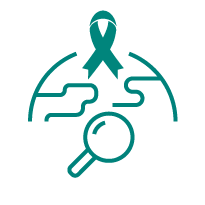WHAT is HPV?¹
HPV stands for Human Papillomavirus, which is a group of widely common viruses that usually cause infections of the reproductive tract.
It is also common that most adults will get infected by HPV at some point in their lives, with some getting infected more than once. Most HPV cases will clear up on their own within a few months, and about 90% will resolve within 2 years.
Adults of reproductive age are at the highest risk of getting HPV infections. While many types of HPV are harmless, there are many high risk types that can cause certain cancers in women, such as those that may persist and progress into cervical cancer.
HPV BY THE NUMBERS
Did you know?

As of 2011, about
660,000,000 people worldwide
are infected with HPV.²

85% of women in the reproductive
age may get the HPV infection at
some stage in their life.³

~1 in 27 cancers worldwide
were caused by HPV.⁴,⁵

Each year, there are approximately
12,000 cases of cervical cancer leading
to over 4,000 deaths among women.⁶
HPV-RELATED CANCERS
HPV is the leading cause of several types of cancers. ⁴,⁷⁻⁹
The HPV infection can lead to*,**

90% of high-grade
cervical precancers¹⁰

75% of low-grade
cervical lesions¹⁰
Estimates based on incidence data and US Census World population figures*.
Not all cervical precancers and lesions are caused by HPV**.
How can HPV infection lead to cervical cancers?¹
Most HPV infections clear up on their own, and most precancerous lesions resolve spontaneously.
However, women are still at risk of HPV infection becoming chronic and progressing to invasive cervical cancer.
It takes 15 to 20 years for cervical cancer to develop in women with normal immune systems, whereas it can take only 5-10 years to develop in women with weakened immune systems, such as those with untreated human immunodeficiency virus or HIV infections.
SIGNS AND SYMPTOMS
HPV has no signs or symptoms.¹¹
Here is how women might find out if they are infected.

Most people with HPV do not know they are infected and never develop symptoms and health problems from it.

Some people find out they have HPV when they develop warts.

Women may find out they have HPV when they get an abnormal Pap test result (during cervical cancer screening).

Others may only find out once they’ve developed more serious problems from HPV, such as cancers.
HOW IT SPREADS ¹¹⁻¹³


